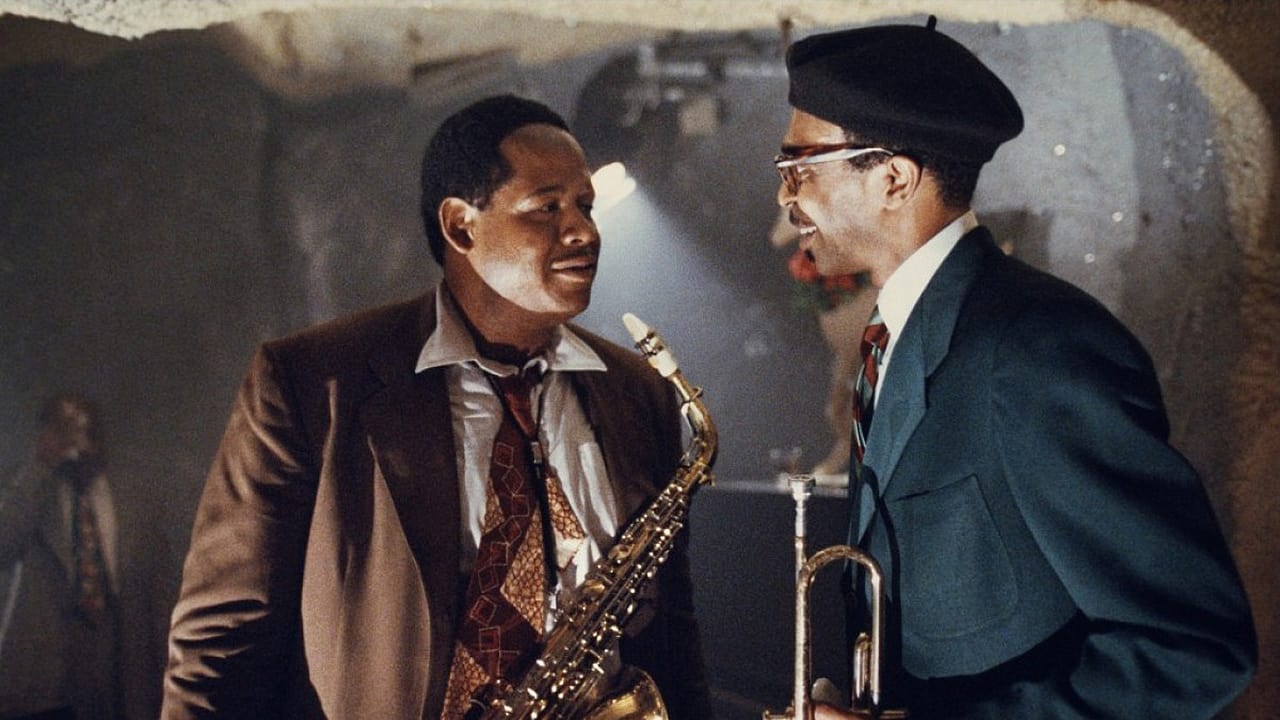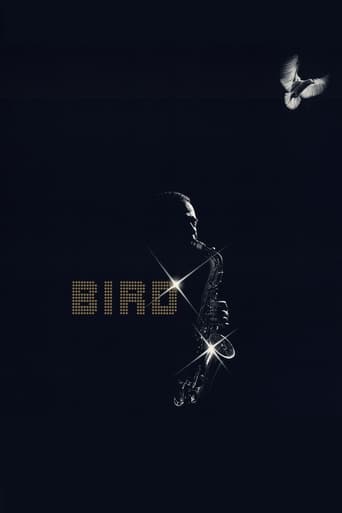Blucher
One of the worst movies I've ever seen
LouHomey
From my favorite movies..
Humbersi
The first must-see film of the year.
Sameer Callahan
It really made me laugh, but for some moments I was tearing up because I could relate so much.
Dr Jacques COULARDEAU
The life of Charlie Parker is Christ-like, to the point of dying at the age of 34. Clint Eastwood does not insist on his youth and origins. He concentrates on the mature musician from the moment he gets into the profession (with a cabaret card) to the moment when he dies and gets out of it, still with his cabaret card, at least in his dying heart. Charlie Parker represents a very typical case. The musician is stepping out of real life with his music. He steps into another world where the weight of the body and the ethics of the mind do not exist any more, and that's why his music is luminous and so entrancing. We are literally swallowed up by that swinging force because it is from an out world that is beyond pure comprehension and that is only to be enjoyed. But to produce that joy, that beauty and that light the musician has to burn his own life slowly but surely till death ensues. Alcohol, tobacco, drugs, wild living and no regularity at all, insanity too of the psychotic type quite often are the companions and the tools of this musician and even the few friends he meets along the way, both other musicians, or women and men who just love him are not enough to stop the fire that consumes him, especially because without that consumption that burns him inside out he would not be able to play music, to compose music, to create music. Clint Eastwood really renders that psychotic world with a force and a power that makes the film too short even if it were two hours longer. We would like to just drown in that music and in that soul that feeds us that music as if it were the honey of paradise and the blood of life. But every single drop he gives us is a drop he loses in his veins. Till they are dry and the heart empty. A musician is always in a way committing a self-sacrifice of his life on the altar of our pleasure.Dr Jacques COULARDEAU, University Paris 1 Pantheon Sorbonne, University Paris 8 Saint Denis, University Paris 12 Créteil, CEGID
writers_reign
It's been claimed that this is the Best film about Jazz ever made and whilst the glib response may be yeah, maybe, but how MANY films about Jazz have been made, the tendency is to agree. What is undeniable is the fact that director Eastwood - a well-known jazz buff - has not been content with the four-bar taste of the music then cutting away from the band to a dialogue scene approach which is what fans usually get fobbed off with, here we actually are allowed to savour (assuming, of course, the music is our prime reason for watching the film) not only the genius of Parker but also the music scene as it existed roughly between 1945-55 and though he isn't named aficionados will know it was Jo Jones who threw the cymbal at Parker to register disgust. 52nd St - known as Swing Street - has also been lovingly recreated so already we have accumulated a host of positives, throw in the remarkable lead performance from Forest Whitaker and we are talking great movie.
Tashtago
I watched about a third of this and got so fed up I just put a Charlie Parker cd on instead. The movie looks great and the principals are good especially Forrest Whitaker but there's very little about the music and his interactions with fellow musicians and producers. That would be interesting, instead we get typical Hollywood romance/tragic romance stuff. Bird focuses almost exclusively on Parker's relationship with Chan and his drug addiction, Bird suffers because of that. It's kind of like the bebop version of Titanic. Eastwood is a good sometimes great (Mystic River,White Hunter Black Heart ) director but often he seems entrenched in Hollywoodisms, sort of Ron Howard on steroids.
WillyHill74
Being a jazz musician and enthusiast, I was really excited to see this movie. However, it ended up being a dreary and disappointing film that dragged on and on.The story line, as haphazardly arranged as it is, revolves mostly (and justly so) around Parker's debilitating drug addiction, but also around his marriage to Chan. However, it never mentioned his first wife, Doris. The film also tended to dwell (perhaps unjustly so) on his musical relationship with the white trumpeter, Red Rodney. It was surprising how little of it involved Parker's best-known musical partner, Dizzy Gillespie. Miles Davis, who collaborated with Parker a lot during '48 and '49, receives only a quick glimpse in the background during a recording session.I would have liked to see much more about Parker's development and childhood. Also, I felt that the movie could have used a bit more humor, seeing as Parker was one of the first truly interesting characters in jazz, even though that was, sadly, because of his drug addiction."Bird" tends to drag on and on, with the best parts being when Parker plays on camera. I felt that the best scene was the performance at a Jewish wedding. That cracked me up, seeing Bird play a regular Klezmer song and then break into a wildly brilliant bebop improvisation. I don't know if that really happened, but it was fun all the same."Ray" is a movie from the same vein as "Bird," but far better.

